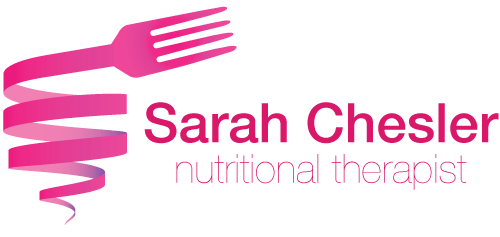Start your journey now!
Whether your goals are to improve your overall wellbeing or to gain support for a specific health issue, I am ready to design your bespoke dietary programme and coach you to making sustainable lifestyle changes.
About Me
I am a nutritional therapist who loves good food and thrives on empowering people to make practical choices that support and enhance their wellbeing.
Health-giving nutrition has always been at the forefront of my life, as I have battled with my own health issues. I know only too well how making the right food choices can positively impact on my symptoms. This understanding and passion for Nutritional Therapy has proven invaluable in assisting my clients to improve their health and quality of life.
I have special interests in:
- Autoimmune Conditions
- Bone and Joint Health
- Blood Sugar Management
- Digestive Health
- Female Health
- Liver Detoxification
- Weight Management

Sarah Chesler
DipION, mBANT, CNHC
I am a Registered Nutritional Therapist accredited by the Complimentary & Natural Healthcare Council (CNHC), a government sponsored registration body for complimentary healthcare practitioners. I am also a member of the British Association for Applied Nutrition & Nutritional Therapy (BANT).
About Me
I am a nutritional therapist who loves good food and thrives on empowering people to make practical choices that support and enhance their wellbeing.
Health-giving nutrition has always been at the forefront of my life, as I have battled with my own health issues. I know only too well how making the right food choices can positively impact on my symptoms. This understanding and passion for Nutritional Therapy has proven invaluable in assisting my clients to improve their health and quality of life.
I have special interests in:
- Autoimmune Conditions
- Bone and Joint Health
- Blood Sugar Management
- Digestive Health
- Female Health
- Liver Detoxification
- Weight Management

Sarah Chesler
DipION, mBANT, CNHC
I am a Registered Nutritional Therapist accredited by the Complimentary & Natural Healthcare Council (CNHC), a government sponsored registration body for complimentary healthcare practitioners. I am also a member of the British Association for Applied Nutrition & Nutritional Therapy (BANT).
What is nutritional therapy?
What is nutritional therapy?
Nutritional therapy is the application of nutrition science in the promotion of health, peak performance and individual care. Nutritional therapy practitioners use a wide range of tools, including the latest laboratory testing, to assess and identify potential nutritional imbalances in order to provide an understanding of why and how these may contribute to an individual’s symptoms. It allows them to work with individuals to achieve nutritional balance and support the body for maintaining health.
Nutritional therapy is the application of nutrition science in the promotion of health, peak performance and individual care. Nutritional therapy practitioners use a wide range of tools, including the latest laboratory testing, to assess and identify potential nutritional imbalances in order to provide an understanding of why and how these may contribute to an individual’s symptoms. It allows them to work with individuals to achieve nutritional balance and support the body for maintaining health.
Nutritional therapy is recognised as a complementary medicine. It is relevant both for individuals looking to enhance their health and wellbeing and for those with chronic conditions wishing to work with a nutritional therapist in collaboration with other suitably qualified healthcare professionals.
Practitioners consider each individual to be unique from a genetic, lifestyle and environmental standpoint and that all these factors need to be taken into account in order to recommend effective, safe and bespoke nutrition and lifestyle programmes.
Practitioners never recommend nutritional therapy as a replacement for medical advice and always refer any client with ‘red flag’ signs or symptoms to their medical professional. They may work alongside other medical professionals involved in the client’s care.
Nutritional therapy is relevant both for individuals looking to enhance their health and wellbeing and for those with chronic conditions.
Practitioners never recommend nutritional therapy as a replacement for medical advice and always refer any client with ‘red flag’ signs or symptoms to their medical professional. They may work alongside other medical professionals involved in the client’s care.
In the UK, Nutritional Therapy is regulated by a Register managed by the Complimentary & Natural Healthcare Council (CNHC), a government-sponsored body dedicated to safeguarding the public by ensuring that all registered practitioners meet the National Occupational Standards for healthcare disciplines. The CNHC register has been approved as an Accredited Register by the Professional Standards Authority for Health and Social Care. A Nutritional Therapist can only display the CNHC quality mark if they have the appropriate level of training and competence. In order to retain the CNHC quality mark, Nutritional Therapists are required to update and develop their professional skills through an on going programme of Continuing Professional Development (CPD).


Consultations
Consultations
I work with clients to nutritionally support their bodies, so that they can rebalance and heal. As there are no one-size-fits-all approaches, each protocol that I recommend is bespoke and you will receive a health optimisation programme, after each consultation, that is based on your individual health, history, symptoms and if necessary test results.
I work with clients to nutritionally support their bodies, so that they can rebalance and heal. As there are no one-size-fits-all approaches, each protocol that I recommend is bespoke and you will receive a health optimisation programme, after each consultation, that is based on your individual health, history, symptoms and if necessary test results.
Initial Consultation
During your consultation, we will discuss your health goals and explore any other health concerns you may have. I will then explain what the possible underlying imbalances are, and together we will agree a bespoke programme that fits with your food preferences, lifestyle and objectives.
Follow-up
Consultation
Follow-up consultations are recommended after around 4 weeks, to review progress, or any difficulties experienced. This is also a chance to discuss further health goals or feedback on any functional test results. Health Optimisation Programmes will be adapted after these appointments.
Fridge, larder
& grocery
Consultation
These sessions include tips and recommendations on how to detox your kitchen while you plan and start your new healthy eating regime. After all, the easiest ways to form healthy eating habits are to first clear out your kitchen and modify your shopping!



Initial Consultation
During your consultation, we will discuss your health goals and explore any other health concerns you may have. I will then explain what the possible underlying imbalances are, and together we will agree a bespoke programme that fits with your food preferences, lifestyle and objectives.

Follow-up
Consultation
Follow-up consultations are recommended after around 4 weeks, to review progress, or any difficulties experienced. This is also a chance to discuss further health goals or feedback on any functional test results. Health Optimisation Programmes will be adapted after these appointments.

Fridge, larder
& grocery
Consultation
These sessions include tips and recommendations on how to detox your kitchen while you plan and start your new healthy eating regime. After all, the easiest ways to form healthy eating habits are to first clear out your kitchen and modify your shopping!

Supplements & functional testing
If necessary, private functional testing may also be recommended to help devise the most appropriate programme to support your health goal. Alternatively, you may be referred back to your GP for tests, if these are available on the NHS. Among others, typical tests could include a blood test to identify possible nutrient deficiencies, a saliva test to assess hormonal profiles, or a stool test to investigate digestive function.
The costs of supplements or tests are not included in consultation fees and should be paid direct to suppliers by clients.
Frequently asked questions
Frequently asked questions
Why should I consult a nutritional therapist?
- I struggle from loosing weight even when on a calorie restricted diet
- I can’t stop craving sweet things
- I have dreadful PMS symptoms
- I often feel tired and sluggish
- I am often bloated
- I wake up in the night
- I suffer from aches and pains
What does a nutritional therapy session typically involve?
- Before the first consultation, I usually provide a health and nutrition questionnaire for my clients to complete.
- An initial consultation lasts 1 hour, during which I will ask you detailed questions about your health, diet and lifestyle.
- I will then evaluate your individual needs and using the extensive evidence base for nutritional science, I will develop a personalised, safe and effective health optimisation programme.
- Follow up consultations are generally after 3-4 weeks in order to monitor progress and make any necessary adjustments.
I can’t seem to stop making unhealthy choices . How do I get the willpower to make better decisions about what I put into my body?
- This is a challenge we all face on a regular basis and I find the best way to deal with it is by doing a kitchen, fridge and larder detox. By removing all the unnecessary food items and filling our homes and kitchen with fresh food really helps in overcoming unhealthy food choices and cravings.
How can I sustain eating perfectly?
- We are all human and eating well is not about perfection. For me, it’s learning how to make the right choices by knowing which foods work for you and which don’t.
- Making the right choices tends to make one feel better, and this can soon develop into lasting healthy habits
If I start eating the right foods and follow recommended lifestyle changes, is it still necessary that I take supplements?
- The need for supplementation can depend on our age, lifestyle and individual health requirements.
- For example, as we age our ability to absorb nutrients from food can decrease and supplementation can be vital. Exercise also increases nutrient needs, and active individuals may require added nutrient consumption to compensate for the energy they expend.
Why is it important that one chooses a practitioner who is BANT and CNHC registered?
- It is important to choose a qualified nutritional therapist who has been properly trained, qualified and insured.
- Check whether a nutritional therapist is registered with the British Association for Applied Nutrition & Nutritional Therapy (BANT) as well as the Complementary & Natural Healthcare Council (CNHC) by searching their websites at www.bant.org.uk and www.cnhc.org.uk.
Frequently asked questions
Frequently asked questions
Why should I consult a nutritional therapist?
- I struggle from loosing weight even when on a calorie restricted diet
- I can’t stop craving sweet things
- I have dreadful PMS symptoms
- I often feel tired and sluggish
- I am often bloated
- I wake up in the night
- I suffer from aches and pains
What does a nutritional therapy session typically involve?
- Before the first consultation, I usually provide a health and nutrition questionnaire for my clients to complete.
- An initial consultation lasts 1 hour, during which I will ask you detailed questions about your health, diet and lifestyle.
- I will then evaluate your individual needs and using the extensive evidence base for nutritional science, I will develop a personalised, safe and effective health optimisation programme.
- Follow up consultations are generally after 3-4 weeks in order to monitor progress and make any necessary adjustments.
I can’t seem to stop making unhealthy choices . How do I get the willpower to make better decisions about what I put into my body?
- This is a challenge we all face on a regular basis and I find the best way to deal with it is by doing a kitchen, fridge and larder detox. By removing all the unnecessary food items and filling our homes and kitchen with fresh food really helps in overcoming unhealthy food choices and cravings.
How can I sustain eating perfectly?
- We are all human and eating well is not about perfection. For me, it’s learning how to make the right choices by knowing which foods work for you and which don’t.
- Making the right choices tends to make one feel better, and this can soon develop into lasting healthy habits
If I start eating the right foods and follow recommended lifestyle changes, is it still necessary that I take supplements?
- The need for supplementation can depend on our age, lifestyle and individual health requirements.
- For example, as we age our ability to absorb nutrients from food can decrease and supplementation can be vital. Exercise also increases nutrient needs, and active individuals may require added nutrient consumption to compensate for the energy they expend.
Why is it important that one chooses a practitioner who is BANT and CNHC registered?
- It is important to choose a qualified nutritional therapist who has been properly trained, qualified and insured.
- Check whether a nutritional therapist is registered with the British Association for Applied Nutrition & Nutritional Therapy (BANT) as well as the Complementary & Natural Healthcare Council (CNHC) by searching their websites at www.bant.org.uk and www.cnhc.org.uk.
My blog
My blog
Guide to Healthy Fats and Oils
Many of my clients are still feeling confused when it comes to eating fats and/or choosing which oils to cook with. So, I decided to put together a simple guide that will hopefully clear up any misunderstandings... After a lifetime of being told that saturated...
Dry January
Gentle guidelines to help boost your liver and achieve your New Year goals.
Keep Calm over Christmas!
Managing stress levels is vital for our health. Here’s how I would suggest you keep your stress levels under control this Christmas.
Teenage Nutrition
Teenagers go through a massive growth, in both physical and emotional development, and as a result their bodies demand more nutrients in order for these changes to happen optimally. As a mum of two – with one of whom is a preteen – I thought I’d talk about some...
It’s Exam Time – Boost your Brain!
Everyone’s capacity to learn is different, however to ensure that you or your child has the best opportunity to absorb and retain all the information that is needed to pass your exams, eating the right foods is an essential. Stress, late nights, lack of sleep...
Constipated? Strategies to Get Things Going.
Constipation can mean different things to different people, however ideally being regular means having between 1 and 3 bowel movements per day. Proper digestion and elimination are essential for good health as chronic constipation can allow toxins and excess...
Get in touch
Get in touch
Hendon
London
NW4
Telephone
07860 472261
email
nutrition@sarahchesler.com







